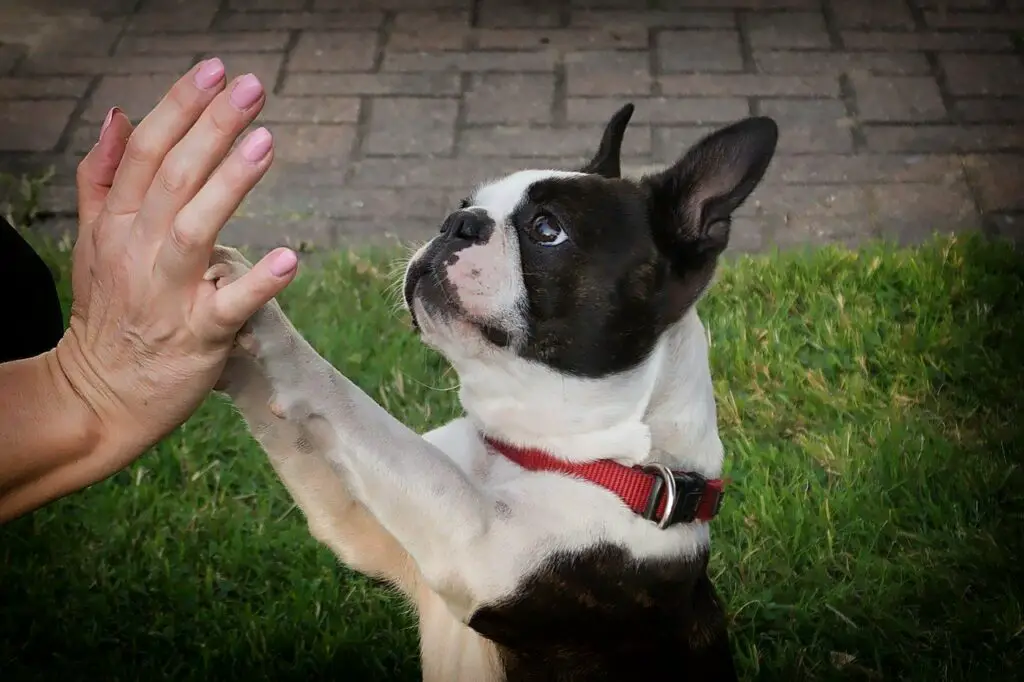You love dogs but can’t stand their excessive barking.
Nonetheless, you are looking for a cute dog with a gentle temperament and flirt with the idea of getting a Boston terrier but wonder if they bark a lot.
So, do Boston Terriers bark a lot?
Boston Terriers are calm and quiet dogs and do not bark excessively.
They tend to increase their barking intensity when seeking attention, anxious, or feeling threatened compared to other dog breeds.
Let’s explore more about your Boston Terrier, their barking habits, and how to stop your dog from barking excessively, in case he does.

Why Boston Terriers bark less than other dogs
The Boston Terrier’s barking nature boils down to their history.
The world’s largest and oldest dog breed registry, the American Kennel Club, has classified the Boston Terrier as the AKC Non-Sporting group and isn’t considered a terrier.
Other terriers are energetic and loud and classified as working dogs.
The Boston Terrier isn’t a working dog which explains its calm demeanor and lower vocals.

Do Boston Terriers bark more than other dog breeds?
Boston Terriers are less aggressive and usually calmer than most dogs.
However, the calm temperament doesn’t mean that Boston Terriers don’t entirely bark.
The triggers that can cause other dog breeds to go crazy often, like cars driving down the street or that ball thrown into the yard, may fail to raise a reaction in your Boston Terrier.
Boston Terriers vs. other terriers
Many terrier breeds are energetic and active and have loud barks.
They bark when playing, when happy, at the sight of strangers, and even when left alone.
Boston Terriers tend to have a lower, more faint bark than other terriers’ loud shrill bark.
Boston terriers vs. french bulldogs
Boston Terriers and French Bulldogs have similar ancestry and have the same characteristics.
The two breeds don’t bark often, and when they do, it is minimal and low.

Reasons why your Boston Terrier may bark excessively
You may find that your Boston Terrier barks a lot.
The barking may concern you, especially if you live in an apartment or your furry friend is disturbing your peace.
Your Boston Terrier barking a lot is due to its personality and individual traits.
There could also be other factors that may trigger your canine to bark excessively.
They include:
Attention
when your Boston Terrier seeks your attention, he will bark.
The barking can get out of hand, especially if your canine does not get enough attention.
Ignoring your pup will make the barking louder.
Continue ignoring the barking and show encouragement when he stops by giving him a treat.
Giving in and showing attention every time your dog barks will encourage the behavior, and the barking may increase frequency.
Excitement
When you get home from work or your kids get home from school, your furry friend tends to bark due to happiness and excitement.
Another instance is when feeding your dog or giving him treats.
The bark is a way of showing you they are happy and excited.
Aggression
You can tell that your dog’s bark is aggressive because he will also snarl and growl.
It would be best to immediately tame an aggressive bark for your dog’s, household members’, neighbors’, and visitors’ safety.
Separation anxiety
Dogs too suffer from fear of separation, which can cause barking.
If your Boston Terrier barks when you leave the house or the room, they most likely suffer separation anxiety.
The behavior may be less likely in a busy household with a family member around than in a single dog owner who leaves the dog alone when they leave for work or other errands.
Fear and anxiety
Fear in dogs is common and is known as canine phobia.
Your Boston Terrier may fear strangers, moving cars, thunder, fireworks, the veterinarian, a traumatic event, mistreatment, noise, or change of environment, causing them to bark a lot.
How to stop your Boston Terrier from barking excessively
You don’t want to shut your canine up entirely.
Barking is your dog’s way of talking, alerting you when they are happy, uncomfortable, or when there is danger looming.
On the other hand, some dogs can get too excited and bark at the slightest provocation.
Boston Terriers are docile but can learn new habits.
Try some of these tips to stop your furry friend’s unnecessary barking.
Establish the reason for barking
Understand your dog’s motivation for barking.
Pay attention, observe and analyze the time, surroundings and reasons and this will help narrow
down the causes.
If you’re still unable to establish a cause, engage a dog trainer.
Offer a distraction
Distract your furry friend by asking him to bring you a toy.
Giving him a toy instead will be misconstrued as rewarding his barking.
Ignore
This applies especially to attention barking.
Avoid eye contact and do not respond to the barking.
When your Boston Terrier calms down, give him the attention.
Your canine will come to learn that barking is not appreciated.
Also, give treats when your dog stops barking as a reward.
Your dog will associate a nice treat with not barking and know that they won’t get any if they bark.
Desensitization
After establishing the trigger to your furry friend’s barking, work on training your dog to
disassociate barking and the motivation.
So, if, for instance, your Boston Terrier constantly barks when the alarm goes off, expose him to
the alarm sound and offer him a treat when he stops barking.
Desensitization will also help your dog overcome some of his phobias.
If desensitization doesn’t work, remove the trigger.
For example, you can vacuum the house when your dog is outside if he constantly barks at the
noise from the vacuum cleaner.
Tire your dog
Boston Terriers have less energy than other terriers and tire easily.
Take your dog for long walks, have the dog play, and be consistently engaged when not resting.
Your dog will be too tired to bark excessively.
Training
Teach your Boston Terrier simple commands that he can easily follow.
Your dog will learn to listen and follow instructions.
If you find training hard, engage a professional trainer.
Be patient and consistent
Patience and consistency during the training process are critical.
Consistently ignoring your dog when he barks or taking your dog for walks at a regular time is
guaranteed to have positive results.
Final thought
Boston Terriers are cute family dogs.
The fact that they are docile and not excessively noisy makes them endearing.
Barking is one of your canine’s ways to communicate, so it helps if you learn his different types of barking to understand the triggers and the best way to handle them.
- What Dog Breeds Have Pink Skin? - March 24, 2023
- What Are the Most Inspiring Dog Breeding Quotes? - March 20, 2023
- Can Pheromone Spray Help Improve Dog Breeding Results? - March 19, 2023








